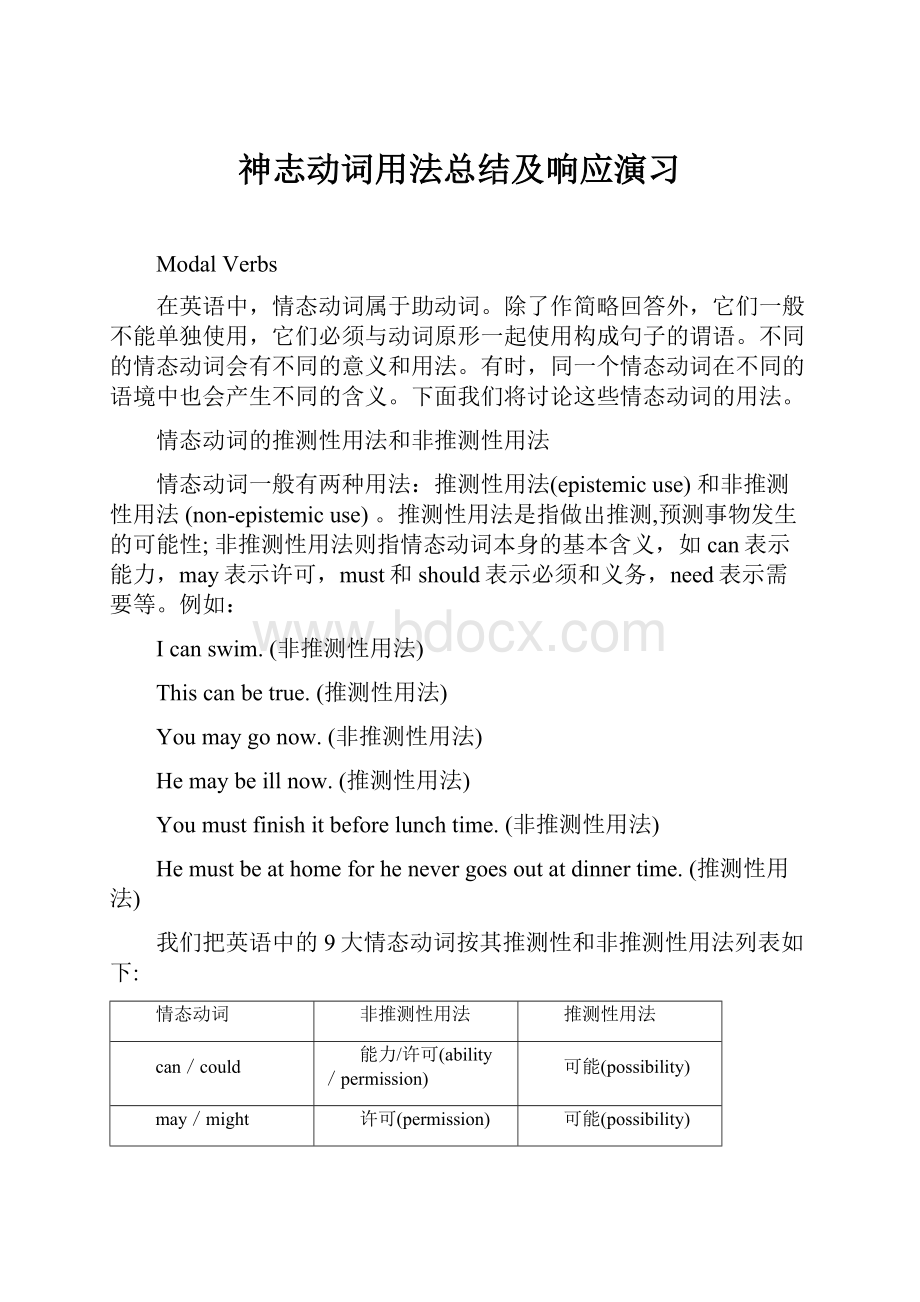神志动词用法总结及响应演习.docx
《神志动词用法总结及响应演习.docx》由会员分享,可在线阅读,更多相关《神志动词用法总结及响应演习.docx(18页珍藏版)》请在冰豆网上搜索。

神志动词用法总结及响应演习
ModalVerbs
在英语中,情态动词属于助动词。
除了作简略回答外,它们一般不能单独使用,它们必须与动词原形一起使用构成句子的谓语。
不同的情态动词会有不同的意义和用法。
有时,同一个情态动词在不同的语境中也会产生不同的含义。
下面我们将讨论这些情态动词的用法。
情态动词的推测性用法和非推测性用法
情态动词一般有两种用法:
推测性用法(epistemicuse)和非推测性用法(non-epistemicuse)。
推测性用法是指做出推测,预测事物发生的可能性;非推测性用法则指情态动词本身的基本含义,如can表示能力,may表示许可,must和should表示必须和义务,need表示需要等。
例如:
Icanswim.(非推测性用法)
Thiscanbetrue.(推测性用法)
Youmaygonow.(非推测性用法)
Hemaybeillnow.(推测性用法)
Youmustfinishitbeforelunchtime.(非推测性用法)
Hemustbeathomeforhenevergoesoutatdinnertime.(推测性用法)
我们把英语中的9大情态动词按其推测性和非推测性用法列表如下:
情态动词
非推测性用法
推测性用法
can/could
能力/许可(ability/permission)
可能(possibility)
may/might
许可(permission)
可能(possibility)
will/would
意愿(volition)
预言性(predictability)
should/oughtto
责任和义务(obligation)
应该是(logicalnecessity)
must
责任和义务(obligation)
一定,肯定(logicalnecessity)
情态动词非推测性用法的说明
1.may和might表示允许
may可以与不同的人称搭配,表示“许可、允许”。
例如:
MayIknowyourname?
Youmaybethefirsttoleaveifyouareinahurry.(我允许你第一个离开。
)
Youmaykeepthebookfortwomonths.(我允许你借。
)
Incertaincircumstancesapoliceofficermayaskadrivertotakeabreathtest.
may用在疑问句中,经常表示“允许、许可”的意思。
例如:
MayIknowyourname?
MayIcomein?
might可以用来表示过去时态,也可以表示委婉语气。
例如:
Shesaidthathemighttakeherdictionary.(may的过去式)
MightIhaveawordwithyou?
(委婉用法)
IwonderifImighthavemoresalad.(委婉用法)
但在回答中,我们一般用may加强肯定的语气,而不用might.例如:
Yes,ofcourseyoumay.
maynot可用来表示“禁止”或“不许”,因语气较强,所以不用mightnot.例如:
Studentsmaynotstayoutofthedormitoryaftermidnightwithoutwrittenpermission.
mustnot也可以表示“禁止”,而且语气比maynot更强,强调上级对下级的不允许。
另外,may/mightaswell也是一个常用的词组,后接动词原形,意思是“不妨,最好”
相当于hadbetter.例如:
It'sverylate.Wemightaswellgohome.
2.can和could
1)表示能力
can,could和beableto都可以表示能力。
但若要表示在过去某个具体场合下能够做某事的能力,我们用was/wereableto.例如:
—Thankyouforyourhelp.
—I‘mgladIwasabletohelpyou.(在这种情况下能够帮你,而且已经帮了。
)
所以was/wereableto不仅表示过去的某个具体场合下的能力,还强调动作已经成功完成,相当于managetodo或succeedindoing.例如:
Wewereabletosavehim.(把他救活了。
)
Hewasabletoexplainwhathadhappened.(他能解释,而且也解释了。
)
Hecouldexplainwhathadhappened.(他能做出解释,但可能没有说。
)
但这种区别只局限在陈述句,在否定句中,beableto和could可以互换。
有时,could表示的并不是can的过去式,而是一种委婉的语气。
例如:
Couldyourunthebusinessyourself?
Icouldgiveyouachance.
Couldyoupleasegivemeyourreplyassoonaspossible?
couldhavedone有虚拟的含义,即“本来能够做,但事实上却没有做”。
例如:
Youcouldhavetoldmeearlier.
Icouldhavehelpedher.
IcouldhavepassedtheexamifIhadworkedharder.
2)表示许可
can也可以用来表示“允许”,例如:
CanIsmokehere?
Youcanusemydictionarynow.
Thepolicemansayswecan'tparkourcarhere.
could可以使句子更显礼貌,但在肯定回答中,我们一般用can代替could,加强肯定的语气。
即:
Yes,ofcourseyoucan.
3)其他用法
cannot与help,bear,stand等动词连用,表示“禁不住,受不了”。
例如:
Ifonehadtalent,onecan'thelpshowingit.
Ican'tstandwaitinganylonger.
但是can’thelpbut后面接动词原形,表示“只能”。
Icannothelpbutaskyou:
“doyouhavelovedme?
”
Ican’thelpbutwait.
3.must表示必须
must的这种用法,体现了说话者的权威性,所以must通常用于上级对下级、长辈对小辈。
例如:
Youmustbebackbyteno'clock.
Teacher:
Youmustuseadictionary.I’mtiredofyourspellingmistakes.
[注意]must和haveto的区别:
must表示出于说话者本人的主观愿望,必须去做某事;而haveto表示受外部条件的影响,不得不做某事。
例如:
Imustleavenow.(我自己想离开,主观愿望。
)
Ihavetoleavenow.(也许我还想坐一会儿,但我有要事,不得不走了。
)
HemustsayitinEnglish.(除了英语,他可能还懂其他语言,但我的主观愿望是他必须说英语。
)
HehastosayitinEnglish.(客观条件是他只懂英语,所以不得不用英语说。
)
另外,由于must没有将来时态,所以我们通常用will/shallhaveto来表示;由于must没有过去时态,所以我们通常用hadto来表示。
例如:
Wewillhavetodoitagain.
Ihadtoleaveat6:
30yesterday.
但有时,我们也可以在表示过去的上下文中使用must.
例如:
Itoldhimthathemustmindhisownbusiness.
must有两种否定形式:
mustn't和needn't/don'thaveto.
mustn't表示"不可以“,needn't/don'thaveto表示“不必”,
例如:
Youmustn'ttalklikethat.(不可以=Youarenotallowedtotalklikethat.)
—Mustyouleavesosoon?
—No,Ineedn't.
4.should和oughtto
should和oughtto通常可以交互使用,意义没有多大的区别,表示“应该”。
should和oughtto的这种用法通常表示“建议、敦促或怂恿”。
[比较]must,haveto和should/oughtto所表示的不同语气:
钢琴老师对某学生说:
Youmustpracticeatleastanhouraday.(must显示了老师的权威。
)
这个学生然后对他的朋友说:
Ihavetopracticeanhouraday!
(haveto表示我本身不想练,但迫于老师的压力,不得不练。
)
他的朋友会说:
Yououghtto/shouldpracticeformorethananhour.(表示不是来自外界的权威或压力,而是来自平辈同学或朋友的建议:
如要做个好学生,弹好钢琴。
)
另外,shouldhavedone/oughttohavedone表示“本该发生的事没有发生;
例如:
Youshouldhavetoldmeearlier.
Yououghttohavebeenmorecareful.
5.will和would
will和would作情态动词使用,主要有以下的用法:
1)表示意愿
will和would表示的意愿可强可弱,意愿弱时表示“愿意做某事”(willingness);意愿强时表示“坚持要做某事”(insistence).例如:
Willyougowithus?
(愿意)
Willyoupassmethesalt?
(愿意)
Letushaveatalk,willyou?
(愿意)
Iwillmarryheralthoughmyparentsarestronglyagainstourmarriage.(表示坚持)
would可以表示“过去的愿意”,一般用于间接引语中,例如:
Hesaidhewouldcome.
在其他情况下,would不表示过去,而表示"委婉的语气“,例如:
Wouldyoupleasemakeacopyforme?
但在回答中,为了加强肯定的语气,我们用will.例如:
—Wouldyouletmehearfromyousoon?
—Yes,Iwill.
2)表示能力、趋势或必然性
will和would的这种用法一般以东西作为主语,表示“其内在的性能或特征性倾向”。
例如:
Oilwillfloatonwater.
Goldwon'tdissolveinacid.
否定形式won‘t还可以表示“某事没有达到我们期望的效果”。
例如:
Thecarwon'tstart.
Thedoorwon'topen.
[注意]这里用主动语态。
3)表示习惯性的动作。
例如:
Everymorninghewillsitintheofficedoingnothing.
Hewilloftensaysomethingandthenforgetit.
在这种用法中,would是will的过去式。
例如:
Hewouldneverletanybodyknowwhathewasdoing.
Inthosedayshewouldworkdayandnight,withnotimetocareforhischildren.
6.shall
shall通常有以下用法:
1)表示“说话者的决心或承诺”。
例如:
Ishallnevergiveup.
Theinvadersshallbewipedout.
Youshallgetyoursalarytomorrow.(Ipromise...)
Heshallgethisshare.(Ipromise...)
Youshallstaywithusaslongasyoulike.(Ipromise...)
2)表示“命令”,语气很强。
例如:
Youshallgoatonce.
YoushalldoasIsay.
Youshallnevertelllies.
此种语气因太专横,所以一般不用,但在法律文件和合同条款中,我们通常用shall表示权利和义务。
例如:
PartyAshalladvisePartyBpromptlyconcerninganyinformationthatcomestoPartyA'sattention...
PartyAshall,within14daysofreceiptofawrittenrequestbyPartyB,delivertoPartyBawrittenreportonPartyA'sactivities...
PartyAshallbeanindependentcontractorinallitsoperations.
3)疑问句中用来征求意见。
例如:
ShallIpickyouupatsix?
(Doyouwantmetopickyouupatsix?
)
Shallwegotogether?
Shallhegoonanerrand?
(Doyouwanthimtogoonanerrand?
)
Let'shavearest,shallwe?
7.need
need可以作行为动词,也可以作情态动词。
need作行为动词时,有时态的变化,后面跟动词不定式或名词,其否定式和疑问式要用助动词;need作情态动词时,后面只跟动词原形,其否定式和疑问式不用助动词,而是直接在need后面加上not构成否定式,疑问句直接把need提前。
例如:
Youneedn'tcome.(情态动词)
Iwonderifweneedtakesleepingbags.(情态动词)
Ineedyourhelp.(行为动词)
Ineedtohavealook.(行为动词)
—Needweworktoday?
(情态动词)
—Yes,wemust.(No,weneedn't.)
need作情态动词,表示“需要”,常用在否定句、疑问句或if引导的从句中,在回答need引导的问句中,肯定回答用must加强语气,表示“必须”;否定回答用needn‘t,表示“不必”,相当于nothaveto.
Needn‘thavedone表示“没有做某事的必要,该事本不必做,但却做了”;don’tneedto只是表示“不必做某事,而且该事也确实没有做”。
例如:
Ididn'tneedtogotothestation.(没有去车站)Ineedn'thavegonetothestation.(去了车站)
8.dare
dare可以作行为动词,也可以作情态动词。
dare作行为动词时,有时态的变化,后面跟动词不定式,其否定式和疑问式要用助动词;dare作情态动词时,后面只跟动词原形,其否定式和疑问式不用助动词,而是直接在dare后面加上not构成否定式,疑问句直接把dare提前。
例如:
Iwonderhowshedaredtosaythat.(行为动词)
Wewouldn'tdaretoplaywithyou.(行为动词)
Doesshedaretogotherealone?
(行为动词)
Dareyoujumpovertheditch?
(情态动词)
Shedarenotgooutatnight.(情态动词)
Idarednottellhimthebadnews.(情态动词)
9.hadbetter
hadbetter的意思是“最好”,表示建议,相当于It‘sbetterforyouto....hadbetter后跟省略了to的动词不定式,即hadbetterdo;其否定式为hadbetternotdo,表示“最好不”。
例如:
Wehadbetterstartnow.
Youhadbetternottaketherisk.
情态动词的推测性用法
用于推测性含义时,might可能性最小,must可能性最大。
1.may和might表示可能性
表示“可能性比较大”时,我们用may;如果可能性比较小,我们用might。
例如:
Hemighttellhisfriends.(可能性小)
Hemightbewaitingatthegate.(可能性小)
Hemaybeathome.(可能性大)
Tommaylendyouthebike.(可能性大=Itisverylikelythat...)
Tommightlendyouthebike.(可能性小=Ithinkitisunlikely.)
might也可以表示“过去的可能性”。
例如:
Ifyouinvitedhim,hemightcome.
若要表示“不可能”,我们用can’t或couldn’t。
例如:
Hecan’tbethemanager.Heisonlyajuniorclerk.
在问句中,may只能用来表示“允许”,不能表示可能性;否则,我们用can,doyouthink,isitlikelythat,isitpossiblethat等结构来表示可能。
例如:
—MayIcomein?
(表示许可)
—Yes,comeinplease.
—Wherecanhebe?
(表示可能性)
—Hemaybeintheoffice.
may可与havedone连用,构成mayhavedone,表示“某一事件在过去发生的可能性”。
例如:
—Whyhasn’tshecome?
—Shemayhavemissedthetrain.
--Heisn’tbackyet.Hemayhavehadanaccident.
另外,mighthavedone还有虚拟的含义,表示“与事实相反”。
例如:
Youwerestupidtotryclimbingupthere.Youmighthavekilledyourself.
2.can和could表示可能性
can和could可以表示“事物实际发生的可能性”。
如果逻辑判断是现在或说话时刻作出的,用can\could用来判断可能性,不确定性和委婉的语气要更强一些。
例如:
Can/Couldthenewsbetrue?
Ifyoudon’thaveaguide,youcouldloseyourway.
另外,can的这种用法多出现在否定句中,表示“不可能”。
例如:
Itcan’t/couldn’tbetrue.
Themooncan’talwaysbeatthefull.
Shecan’tbeserious.
cannothavedone表示“过去的时间发生的可能性很小”。
例如:
Thedoorcan’thavebeenopenforIlockeditmyself.
3.must表示极大的可能性
must的此种用法,指的是逻辑上较大的可能性,表示“一定\肯定”,比will和should语气更强。
例如:
Youmustbemadtodothat.(干那事你一定是疯了。
)
must表示“推测”,通常只用于肯定形式,其否定形式为can’t。
例如:
Youmusthavedifficultygettingthetickets.
Youcan’thaveanydifficultygettingthetickets.
对过去动作的推测通常用musthavedone来表示,否定形式是can’thavedone。
Hemusthavetakensleepingpillslastnight.
Youcan’thaveleftyourhandbaginthetheatre.
Idon’tthinkhecanhaveheardyou.Callagain.
1)—CanIhavesomesweets?
Iamhungry.
—Youcan’tbehungry.You’vejusthaddinner.
2)—Amanansweredthetelephone.Isupposeitwasherhusband.
—Itcan’thavebeenherhusband.Hehasbeendeadforages.
must表示猜测的可能性比may的可能性大许多。
比较:
1)钥匙圈上有三把钥匙,其中一把是开房门的。
当我们拿起其中一把时,我们说:
Thismay/mightbethekey.(当试了两把钥匙门都没有开后,我们拿起第三把钥匙。
)这时我们说:
Thismustbethekey.(因为这是最后一把钥匙了。
)
2)看下面的对话:
—IwonderwhyTomhasn’tansweredmyl